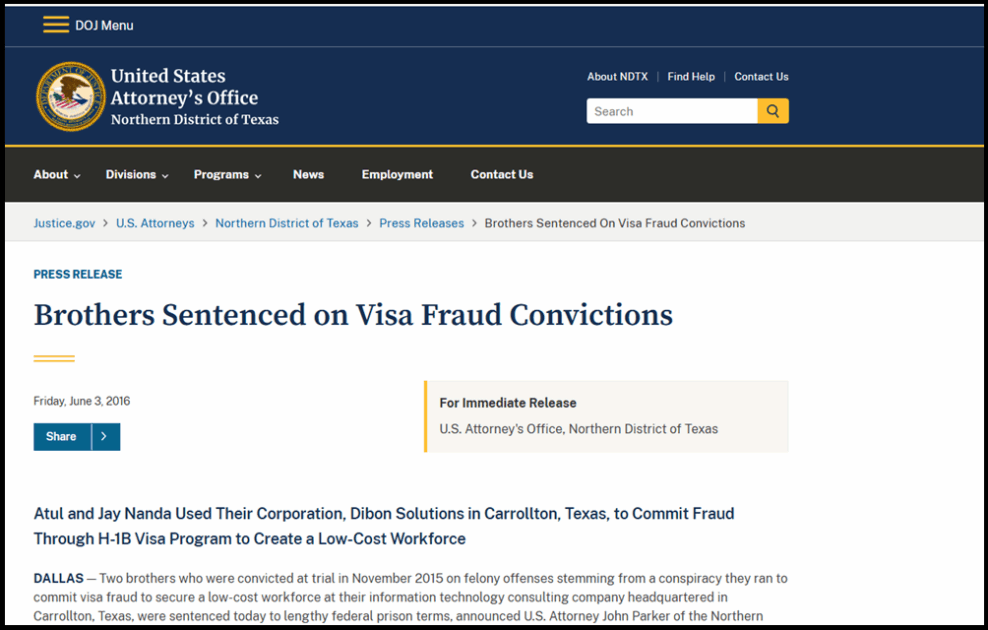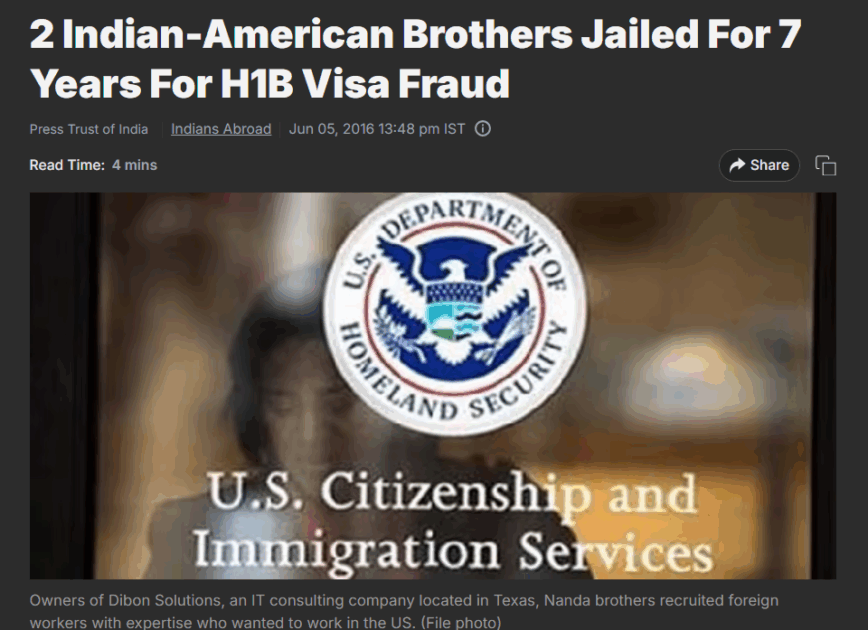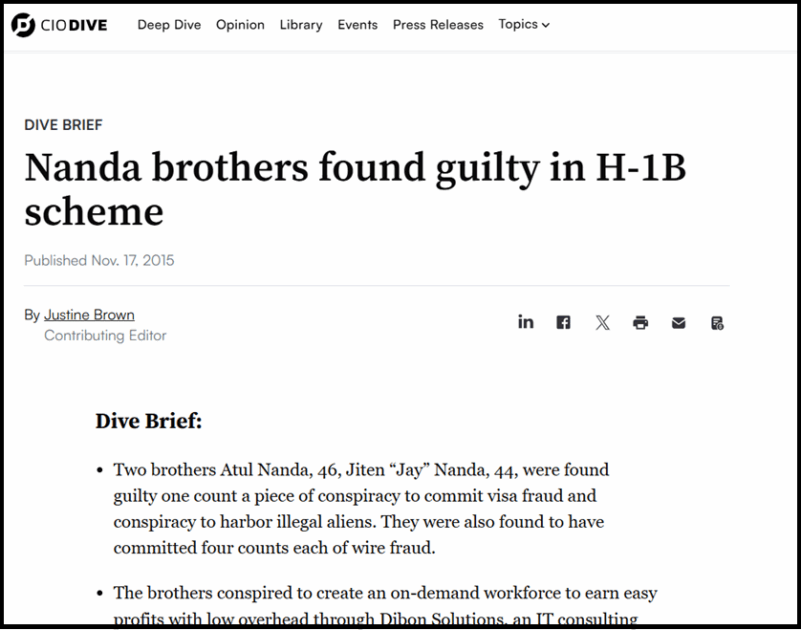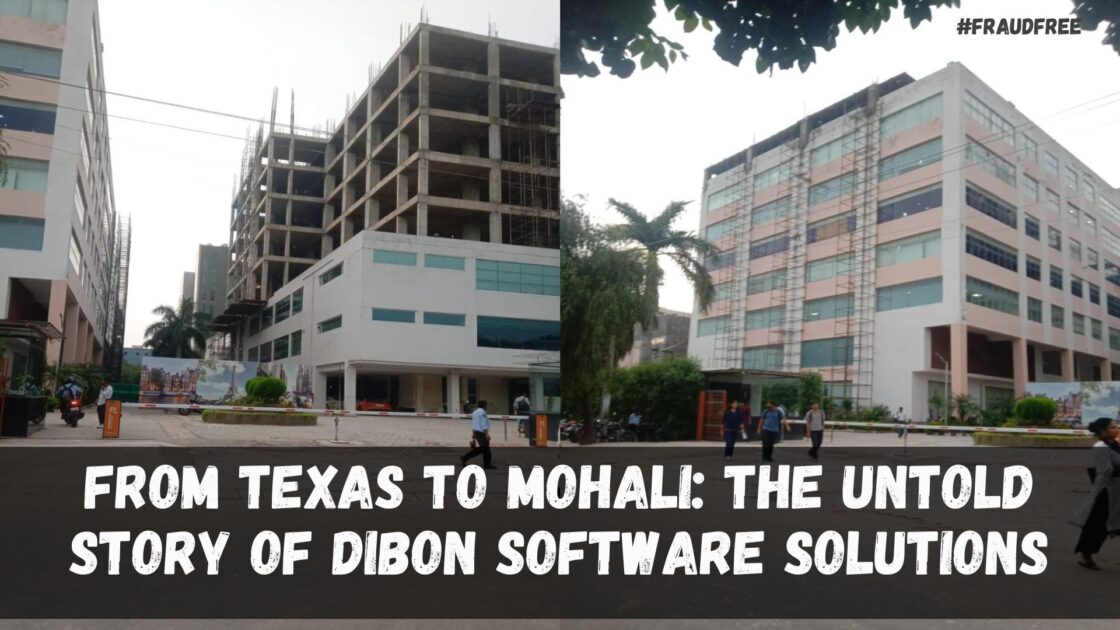When you hear the name Dibon Software Solutions in Mohali today, chances are you’re thinking about a mid-sized IT services company in Sector 67. Job seekers often find their postings on portals, clients may stumble upon their pitches, and locals recognize the office building. On the surface, it looks like just another IT outfit in Punjab’s growing tech hub.
But dig a little deeper, and a very different story begins to unfold. A story that stretches all the way from Texas courtrooms to Mohali boardrooms, centered around two brothers: Atul Nanda and Jiten “Jay” Nanda.
From Texas to Trouble: The Fraud Case You Shouldn’t Ignore
Back in the United States, the Nanda brothers were not just entrepreneurs. They were the faces behind a company called Dibon Solutions, based in Carrollton, Texas. On paper, it was a tech consulting firm helping clients find skilled IT professionals.
In reality, federal prosecutors uncovered a very different business model.
According to the U.S. Department of Justice, Atul and Jay abused the H-1B visa program, a program designed to bring skilled foreign workers to the U.S. for legitimate roles.

Here’s what they did:
- They filed visa applications claiming jobs existed, even when no work was lined up.
- Once the workers arrived, many were left “benched” without pay until Dibon found a client willing to take them.
- They misrepresented salaries, work conditions, and full-time positions in government filings, all to cut costs and maximize profit.
A jury saw through it. In late 2015, both brothers were found guilty of visa fraud, conspiracy, and wire fraud. And in June 2016, a federal judge handed down their punishment: 87 months in prison each, more than 7 years behind bars.
News outlets from NDTV to CIO Dive to Computerworld covered the sentencing.
The case became a cautionary tale about how U.S. immigration programs could be gamed by unscrupulous business owners.


Fast Forward to Mohali: The Rise of Dibon Software Solutions
Now here’s where things get interesting. While their American story ended in disgrace, the Dibon name didn’t die with Dibon Solutions in Texas.
In Mohali, Punjab, there exists a company operating under the banner of Dibon Software Solutions Pvt. Ltd. It’s an IT services firm, software development, outsourcing, consulting—the usual playbook.
The company was originally steered by their father, the late Raj Nanda, who managed operations for many years before his passing about two years ago.
Since 2023, the reins have effectively shifted to his sons, Atul and Jay Nanda, with other family members also listed as directors.
In short: the same brothers who once went to prison in the U.S. for visa fraud are now part of the leadership of Dibon Software Solutions in Mohali.
This isn’t speculation; it’s right there in public filings with the Ministry of Corporate Affairs.
A Family Business with a Global Shadow
It’s worth pausing here.
Dibon Software Solutions in Mohali is not some random branch of the old U.S. Dibon Solutions—it’s a family-run business that has been around in India for years.
At the heart of it is Raj Nanda, the patriarch. Over time, his sons—Atul and Jay—have stepped into directorship roles, effectively taking over the family’s Indian operations.
On the surface, there’s nothing unusual about family succession in business. It happens every day.
But when the successors are individuals who have been convicted of fraud in another country, it raises an obvious question: What kind of business culture is being imported into Mohali under the Dibon Software Solutions name?
Why the Past Matters for the Present
Some might argue: “They’ve served their time. Why drag up old cases?”
Here’s why it matters:
- The fraud in the U.S. wasn’t a minor accounting error; it was a deliberate, years-long scheme that exploited workers and misled the government.
- The fraud was committed through a company that, like Dibon Software Solutions today, was involved in IT staffing and outsourcing.
- The same family, the same name (Dibon), and the same two individuals (Atul and Jay) are now running the Mohali company.
When you line up those facts, ignoring the past would be reckless.
What This Means If You’re a Job Seeker or Client
If you’re a young software engineer looking at a posting from Dibon Software Solutions Mohali, or a business considering outsourcing work to them, here are a few things to think about:
- Do your due diligence.
Always check who the directors are, what their track record is, and how the company treats its employees. - Ask about pay and contracts.
In the U.S., workers were left unpaid on the “bench.” Ask clear questions: Will I be paid even if a client project is delayed? - Check compliance.
If you’re a client, ask how they handle contracts, labor laws, and any cross-border work. - Don’t be swayed by the brand name.
“Dibon” sounds global, but at the end of the day, it’s a family company. The integrity of that family matters.
The Elephant in the Room: Are They Playing Fair This Time?
This is the part that nobody says out loud, but everyone wonders:
- If Atul and Jay Nanda built a fraudulent model once before, in Texas, what’s to stop them from trying something similar in Mohali?
- Can workers and clients trust that Dibon Software Solutions in India is operating by the book?
- Or is this simply a case of the same playbook, in a different country with looser scrutiny?
These are not accusations—they’re questions. But they’re questions worth asking.
Conclusion
The story of Atul Nanda and Jay Nanda is not just a U.S. immigration fraud case. It’s also a story about second chances, accountability, and vigilance.
Yes, they served their prison sentences. Yes, they are now back in India, running operations at Dibon Software Solutions in Mohali, after the demise of their father. Those are facts.
But the bigger question remains unanswered:
Are these two brothers running an honest business today, or are they repeating the same patterns of fraud under a new banner? Do old habits die hard or do they become something normal for you?
As of now, that’s a matter of public scrutiny and one that professionals in the industry should keep a close eye on.







